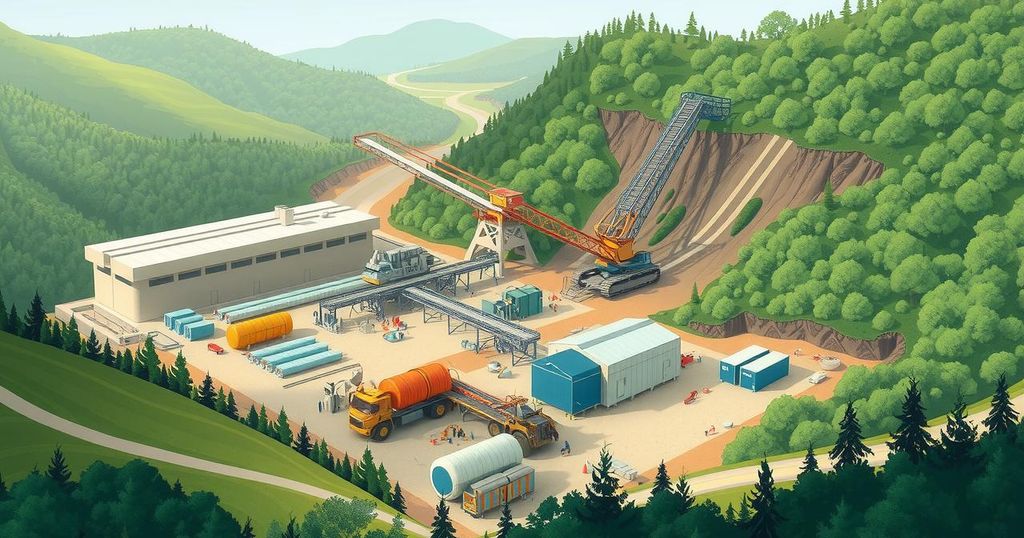Tinubu’s Mining Reforms Attract Over $800 Million in Foreign Investment

Nigeria’s solid minerals sector has attracted over $800 million in foreign investment, spurred by reforms from President Tinubu’s administration. Key changes include a focus on local processing and stricter licensing. Revenue from the sector soared, with projections of further growth as regulatory frameworks strengthen and illegal mining is addressed. The government’s strategy aims to transform Nigeria’s mineral wealth into economic value.
Nigeria’s solid minerals sector is witnessing a remarkable uptick in foreign investment, surpassing $800 million. This surge, as reported by Dr. Dele Alake, Minister of Solid Minerals Development, is primarily attributed to comprehensive reforms initiated by the Tinubu administration. Notably, the reforms include a shift towards local mineral processing and a stricter licensing framework aimed at curbing the export of raw minerals.
In an interview for an upcoming documentary marking President Bola Tinubu’s second year in office, Alake stated, “These investments follow the administration’s insistence that no miner gets a license without a clear local processing plant.” He stressed that the era of exporting unprocessed minerals is now over. Key projects are in the pipeline, including a $600 million lithium processing facility near Kaduna and a $200 million refinery in Abuja.
In overall financial performance, the solid minerals sector generated more than ₦38 billion in 2024, a significant leap from the mere ₦6 billion recorded the previous year. Alake asserted that effective policy reforms are driving this growth, stating, “By the end of 2024, we will hit ₦38 billion. That speaks to the effectiveness of our policy framework.”
Moreover, regulatory bodies have reported considerable revenue growth already in early 2025, with the Mining Cadastral Office and the Mines Inspectorate accruing ₦6.9 billion and ₦7 billion respectively. With a substantial ₦1 trillion allocated for mineral exploration this year, the focus is now on generating certified geological data to entice more serious investors.
Alake also highlighted Nigeria’s need to increase its investment in exploration, revealing that previous commitments were lacking. “Before we came in, Nigeria had only spent $2 million on exploration,” he mentioned, comparing it unfavourably to Sierra Leone, Côte d’Ivoire, and South Africa.
The government is also combating illegal mining. Over the past year, more than 300 illegal miners were apprehended, with prosecutions underway. Alake noted the importance of integrating artisanal miners into the formal economy, with over 250 cooperatives established to regulate and empower them.
Nigeria’s enhanced role in the African mining sector was underscored by its leadership position in the African Mineral Strategy Group. Alake quoted, “We’re leading Africa in saying: no more raw material exports without domestic beneficiation.”
Dr. Alake pointed out that global interest in Nigeria’s minerals is escalating, with discussions at high levels from countries like the UK and the U.S. He remarked, “The U.S. sees Nigeria as a strategic alternative to China for critical minerals.”
Overall, the mining sector is becoming a linchpin in President Tinubu’s economic diversification strategy. Alake concluded, “We’re restoring confidence, building data, enforcing the law, and delivering real value to Nigerians. The Mining Cadastral Office alone received over 10,000 licensing applications this quarter; that’s a clear sign of the vitality we’ve brought under President Tinubu.”
In summary, Nigeria’s solid minerals sector is currently thriving, boosted by the Tinubu administration’s reforms which have attracted over $800 million in foreign investment. With a significant increase in revenue, a robust regulatory framework, and efforts to integrate illegal miners into the formal economy, the future looks promising. The country is positioning itself as a leader in Africa’s mining sector, aiming for a shift from raw material exports to value-added processing. Overall, the current momentum reflects a serious commitment to transforming Nigeria’s mineral wealth into economic growth.
Original Source: guardian.ng




